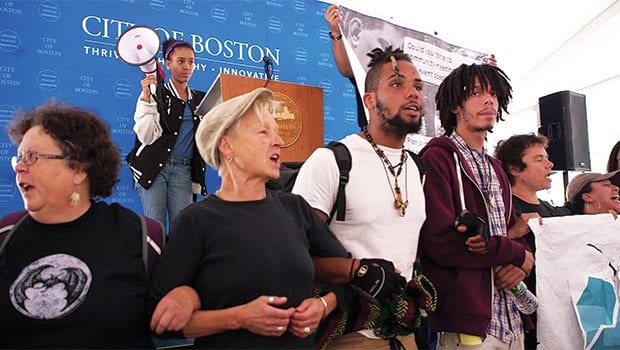Affordable housing activists, re-branded BRA at odds over vision for Boston
Complaints of displacement amid building boom

The Boston Redevelopment Authority rolled out its new brand last week, with a new logo and a new name — the Boston Planning & Development Agency (BPDA) — at a press conference on City Hall Plaza. Affordable housing activists staged a demonstration at the event, unfurling a banner with the new BPDA logo accompanied by the name “Boston Planned Displacement Agency.”
On the web
Current BRA portal: www.bostonredevelopmentauthority.org/
Preview the new BPDA platform: http://meetbpda.bostonplans.org/
In addition to its new name and logo, the BPDA outlined its new organizational identity and brand strategy. But to affordable housing activists, the $670,000 rebranding effort did little to change their perception of the quasi-public agency, which among its many responsibilities coordinates development projects on large parcels of publicly-owned land.
“The BRA, regardless of the name, still does not effectively include neighborhood voices in the planning process,” said City Councilor Tito Jackson. “The BRA needs to know that the issue was never their name. The issue was their actions.”
Both the name change and demonstration come as the city is in the midst of a construction boom that has generated luxury high-rises claiming space on the city’s skyline, heightened levels of real estate speculation and displaced working-class renters from gentrifying neighborhoods like South Boston and Jamaica Plain.
As the city’s primary planning and agency development — which includes physical, social and economic development — the BPDA is the gateway for securing approval for large construction projects, whether in Downtown Boston or the outer neighborhoods. As the BPDA takes a more active role in planning and developing areas such as Dudley Square and Jamaica Plain, it has moved into the crosshairs of affordable housing activists who complain it is facilitating displacement.
Jamaica Plain
Exhibit A: Jackson cites the agency’s work on PLAN: JP/ROX, a nine-month planning process that seeks to shape the course of new development in the area between Jackson Square, Egleston Square and Forest Hills. There, city officials have clashed with affordable housing activists who complain that the city’s goal of 30 percent affordability for new units will do little to stem the displacement spurred by the rapid development of luxury apartment buildings and condominium complexes.
In Chinatown, activists are airing similar concerns, citing the seemingly unceasing emergence of new hotels and luxury buildings that have doubled the neighborhood’s population over the last 15 years, driving up rents and displacing low-income families.
The development boom has added 10,500 new units to the city’s housing stock. But 80 percent of these new units are priced at market rate. With much of that development centered in the city’s downtown neighborhoods — the South End and the Fenway — rents have increased, thus aggravating rather than alleviating price pressures, activists say.
Push for affordability
Mayor Martin Walsh told the Banner his administration is working to increase the city’s stock of affordable housing.
“We have more affordable and moderate income housing planned in the city than ever before,” he said. “Last year, we had 1,022 units of low-income housing built. That’s the largest number of low-income units ever built in one year.”
With a reported 28,694 units in the planning, construction or review stages, Boston may well exceed the Walsh administration’s housing plan, which calls for 53,000 new units by 2030.
Walsh also says the BPDA will change the way it works with neighborhood groups.
“We’re going to be looking at how we change the structure of interaction with the community,” he said.
Throughout the Jamaica Plain planning process, the BPDA held a series of community meetings to glean community views on issues ranging from affordability to transportation. Neighborhood activists expressed a range of ideas and sentiments about development in the area, while planners recorded their ideas. But the process left some participants feeling shut out.
“They know the new construction is not affordable, not just for people earning $35,000 a year, but also for the city average, which is $53,000 for a family of four,” said Jamaica Plain activist Danielle Sommers. “The units being built here are unaffordable to anyone earning less than $100,000.”
She and other activists called on the agency to mandate that 70 percent of all new housing in the area be affordable. Walsh said that goal is unattainable.
“We can’t force private developers to build 70 percent affordable,” he told the Banner.
For whom?
The Jamaica Plain activists, including members of the Jamaica Plain Neighborhood Council, say roughly half the residents in the area make less than $35,000 a year, yet only two percent of the new housing units in the area’s project pipeline are affordable to people in that income bracket.
The Neighborhood Council sent a letter to Walsh expressing dissatisfaction with the plan, which the BPDA Board is scheduled to vote on later this month.
Jackson said the displacement decried by Jamaica Plain activists is happening in most Boston neighborhoods.
“The rate at which people are being displaced will not even be affected with a 13 percent affordable housing rate,” he said, citing the percentage of new units developers are required to set aside for moderate- and low-income people under its Inclusionary Development policy.
Sommers says the city is largely responsible for the surge in luxury housing, pointing to the city’s efforts to attract GE and tech firms to its waterfront innovation district — with its pricey micro apartments — as evidence that the city has created conditions conducive to displacement.
“It’s like we’re moving to become the East Coast San Francisco,” she said. “We’re creating a crisis that’s immanent.”


![Banner [Virtual] Art Gallery](https://baystatebanner.com/wp-content/uploads/2024/04/Cagen-Luse_Men-at-store-e1713991226112-150x150.jpg)



